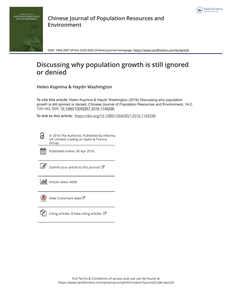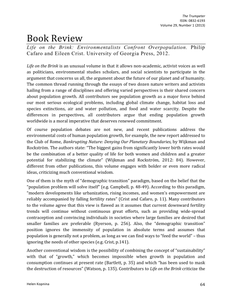At present, leading international agencies, such as the United Nations Environmental Programme, are largely focused on what they claim to be ‘win-win’ scenarios of ‘sustainable development’ rhetoric. These combine social, economic and environmental objectives. However, as noted by the ‘Scientists’ Warning to Humanity’, environmental integrity is the essential precondition for the healthy functioning of social and economic systems, and thus environmental protection needs to be prioritized in policy and practice. Ecological sustainability cannot be reached without realizing that population growth and economic growth, with attendant increased rates of depletion of natural resources, pollution, and general environmental degradation, are the root causes of unsustainability. This article argues that to strategically address ecological unsustainability, the social, economic and political barriers to addressing the current economic model and population growth need to be overcome. Strategic solutions proposed to the current neoliberal economy are generic – namely, degrowth, a steady-state economy, and a ‘circular economy’. Solutions to demographic issues must be sensitive to the countries' cultural, social, political and economic factors to be effective as fertility differs from country to country, and culture to culture. As discussed here, Mediterranean countries have the lowest fertility in the world, while many countries in Africa, and some in Asia, South America have stable but consistently high birthrates. This is discussed using three case studies - Tanzania, Italy, and Cambodia, focusing on the "best case" policy practice that offers more realistic hope for successful sustainability. https://doi.org/10.1007/s41207-019-0139-4 LinkedIn: https://www.linkedin.com/in/helenkopnina/
MULTIFILE

We won 't get a healthier planet with lifestyle programmes and new technologies if we don 't understand the psychological mechanisms behind overconsumption. Today there is food and Netflix, tomorrow is uncertain. Politicians let companies invest in smart technology, smart houses, robotics, AI, so that we can even more easily compensate for our human shortages. A technocratic (robotized) world evokes a lack of recognition and an experience of meaninglessness. Meaninglessness increases insecurity and thus causes more overconsumption, which in turn calls for new control technologies. This is a vicious circle, which ultimately threatens our very survival.
MULTIFILE

This paper provides insights into the operational features of community-based financing mechanisms. These include CAF groups, which are self-financed communities where people save and lend money to each other. The implementation of such self-financed communities in the Netherlands is supported by Participatory Action Research (PAR). This paper discusses the first results of this research by exploring whether and how participation of group members can improve their well-being with regard to social networks, financial household management and entrepreneurial positioning based on the capability approach of Amartya Sen, a well-known economist. For this PAR, three groups were formed, guided, observed, analysed and compared. This paper demonstrates how solidarity economy processes at the grassroots level can contribute to the general well-being of vulnerable people in the Netherlands. For the particular context of overconsumption, inequality and overindebtedness, Sen’s notion of freedom will be reconsidered and adjusted.
DOCUMENT

There is increasing evidence that humans are not living sustainably. There are three major drivers of the unsustainable approach: population, consumption and the growth economy. There is widespread denial about these issues, but they clearly need to be addressed if we are to achieve any of the possible sustainable futures. The first and second versions of the ‘World Scientists Warning to Humanity’ both highlight the problem of increasing human population, as do the IPCC and IPBES reports. However, all have been largely ignored. The size of an ecologically sustainable global population is considered, taking into account the implications of increasing per capita consumption. The paper then discusses the reasons why society and academia largely ignore overpopulation. The claim that discussing overpopulation is ‘anti-human’ is refuted. Causal Layered Analysis is used to examine why society ignores data that do not fit with its myths and metaphors, and how such denial is leading society towards collapse. Non-coercive solutions are then considered to reach an ecologically-sustainable human population. LinkedIn: https://www.linkedin.com/in/helenkopnina/
MULTIFILE

Het is soms lastig om niet te zwichten voor aanbiedingen, maar als je vanuit een duurzaamheidsperspectief naar ons consumentengedrag kijkt, zie je dat we zo niet kunnen doorgaan. Overconsumptie is een belangrijke veroorzaker van de stijging van CO2-niveaus met als gevolg de opwarming van de aarde. Welke rol speel je hierin als individuele consument? Welke rol hebben de overheid en bedrijven? En hoe kan dit veranderen. In een nieuw online college geven lector Victor Verboeket en docent-onderzoeker Jeske Nederstigt ons inzichten en tips over duurzaam consumeren en produceren.
YOUTUBE

Due to a number of factors outlined in this article, the issue of population growth is excluded from the sustainability discussion. In this article, we explore some of the ethical presumptions that underlie the issues linking population growth and sustainability. Critics argue that action to address population creates social and economic segregation, and portray overpopulation concerns as being “anti-poor,” “anti-developing country,” or even “antihuman.” Yet, de-linking demographic factors from sustainability concerns ignores significant global realities and trends, such as the ecological limits of the Earth, the welfare and long-term livelihood of the most vulnerable groups, future prospects of humanity, as well as the ecosystems that support society. https://doi.org/10.1080/10042857.2016.1149296 LinkedIn: https://www.linkedin.com/in/helenkopnina/
MULTIFILE

The authors consider the reality that endless economic growth on a finite planet is unsustainable, especially if society has exceeded ecological limits. The paper examines various aspects of society's endless growth predicament. It reviews the idea that there are 'limits to growth'; it then considers the 'endless growth mantra' within society. The paper then considers the 'decoupling' strategy and its merits, and argues that it is, at best, a partial solution to the problem. The key social problem of denial of our predicament is considered, along with the contribution of anthropocentric modernism as a worldview that aids and abets that denial. Finally, the paper outlines some potential solutions to our growth predicament. https://www.ecologicalcitizen.net/article.php?t=insanity-endless-growth https://www.linkedin.com/in/helenkopnina/
MULTIFILE

Bankrupting Nature: Denying our Planetary Boundaries by Andres Wijkman and Johan Rockström emerges from the original report of The Club of Rome’s The Limits to Growth authored by Meadows and colleagues in 1972. This book demonstrates that an economy built on the continuous expansion of material consumption is utterly not sustainable. Based on the increased evidence of an uncanny correlation between escalating rates of global economic growth and environmental degradation, this book continues to raise worldwide awareness of environmental problems created as a result of anthropogenic activities. Bankrupting Nature demonstrates that political leaders are still in deep denial about the magnitude of global environmental challenges and resource constraints facing the world. The authors state that the challenges of sustainability cannot be met by simply tinkering with the current economic system, but will require major changes in the way members of political and corporate elites and the general public perceive and address environmental and social issues. As reported in a recent press release by The Club of Rome (2012), this volume lays out a blue-‐print for a radically new economic paradigm that links economics with ecology, arguing that this is the only way to generate growth in the future. https://www.linkedin.com/in/helenkopnina/
DOCUMENT

Life on the Brink is an unusual volume in that it allows non-‐academic, activist voices as well as politicians, environmental studies scholars, and social scientists to participate in the argument that concerns us all, the argument about the future of our planet and of humanity. The common thread running through the essays of two dozen nature writers and activists hailing from a range of disciplines and offering varied perspectives is their shared concern about population growth. All contributors see population growth as a major force behind our most serious ecological problems, including global climate change, habitat loss and species extinctions, air and water pollution, and food and water scarcity. Despite the differences in perspectives, all contributors argue that ending population growth worldwide is a moral imperative that deserves renewed commitment. https://www.linkedin.com/in/helenkopnina/
DOCUMENT
